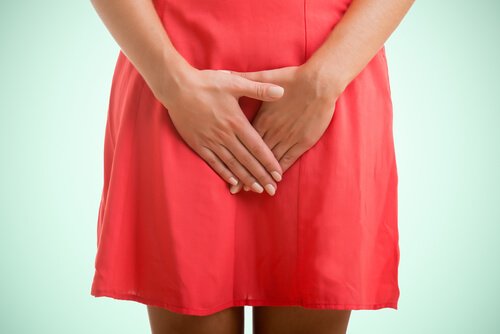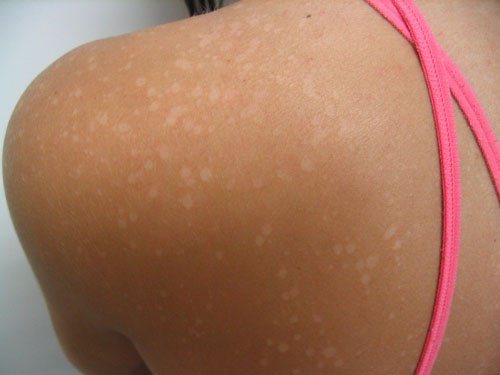Main Reasons for Missed Periods

Missed periods also go by the medical term amenorrhea. It refers to interruptions in the menstrual cycles of women who are still in their fertile years.
The main reason associated with this condition is undoubtedly pregnancy and lactation. However, there are other causes that could make you miss your period that you may not have heard of.
Amenorrhea isn’t just when you don’t bleed. There are multiple other symptoms that go along with missed periods. Examples of these are acne, headaches or weight changes.
Although missed periods aren’t necessarily a serious health problem, you should follow up with your gynecologist.
What are missed periods?
Getting periods is a natural part of a woman’s reproductive cycle. This occurs when the endometrium sheds since the released egg wasn’t fertilized.
When this happens, blood and tissue remain shed from inside the womb. Then, it slides through the vagina until it reaches the outside.
There are three reasons why women might experience missed periods: physiological, anatomical and pathological reasons. First, physiological reasons happen because of pregnancy, lactation or menopause.
On the other hand, anatomical causes have to do with genetic or acquired deformities. These include vaginal agenesis, non-perforated hymen or chromosomal alterations, among others.
Finally, the pathological reasons are even more common than missed periods from pregnancy or lactation. The main causes of this absence of bleeding are the following:
Pathological causes of missed periods
Polycystic ovarian syndrome
This pathology, which affects the endocrine system, is one of the causes why women might miss their period. It’s caused by multiple cysts and high levels of androgens.

Alterations in the pituitary gland
Alterations in the pituitary gland, such as benign tumors, cause missed periods. They can also change the amount of bleeding.
Problems in the hypothalamus
Problems in the hypothalamus are linked to the levels of estrogen and gestagens. For example there are alterations that commonly refer to stress, changes in diet or extreme exercise.
However, they aren’t the only possible conditions. Amenorrhea due to problems with the hypothalamus could also be a result of:
- Hydrocephalus
- Meningitis
- Bleeding during childbirth
- Aneurysms
Regarding the most common problems that cause missed periods because of the hypothalamus, we have:
- Stress: When women live in situations of anguish, pain or high degrees of stress, their CRH levels increase. This prevents gonadotrophins from appearing. This is an alteration that prevents the menstrual cycle from coming to term.
- Changes in diet: Both obesity and malnutrition cause radical hormonal changes. They are so out of balance that they lead to missed periods.
- Extreme exercise: These cause missed periods because they alter prolactin, testosterone and growth hormone.
Using contraceptive pills
On the one hand, women who take “the pill” every day have changes in their menstrual cycles. These changes can go on for two to three months.
In addition, the same happens with implanted contraceptives. Once you remove them, it takes a while for the body to go back to its normal state.
Consuming antacids
Studies show that women who use antacids frequently or for a long time have temporarily missed periods.
“Although missed periods aren’t necessarily a serious health problem, you should follow up with your gynecologist.”
Vaginal infections
The candida albican virus can cause vaginal infections. They can delay periods for a week or even a month. Once you treat the infection, you’ll start bleeding normally again.

Symptoms that accompany amenorrhea
As mentioned before, amenorrhea can be accompanied by other annoying symptoms. The most common ones are:
- Acne
- Headache
- Changes in weight or feeling of swelling
- Skin marks on the face, mainly brown skin
- Craters on the face
- Excessive production of grease on the face and hair
Your gynecologist can quickly and efficiently treat the causes of missed periods. Don’t hesitate to schedule an appointment if you’re worried.
Missed periods also go by the medical term amenorrhea. It refers to interruptions in the menstrual cycles of women who are still in their fertile years.
The main reason associated with this condition is undoubtedly pregnancy and lactation. However, there are other causes that could make you miss your period that you may not have heard of.
Amenorrhea isn’t just when you don’t bleed. There are multiple other symptoms that go along with missed periods. Examples of these are acne, headaches or weight changes.
Although missed periods aren’t necessarily a serious health problem, you should follow up with your gynecologist.
What are missed periods?
Getting periods is a natural part of a woman’s reproductive cycle. This occurs when the endometrium sheds since the released egg wasn’t fertilized.
When this happens, blood and tissue remain shed from inside the womb. Then, it slides through the vagina until it reaches the outside.
There are three reasons why women might experience missed periods: physiological, anatomical and pathological reasons. First, physiological reasons happen because of pregnancy, lactation or menopause.
On the other hand, anatomical causes have to do with genetic or acquired deformities. These include vaginal agenesis, non-perforated hymen or chromosomal alterations, among others.
Finally, the pathological reasons are even more common than missed periods from pregnancy or lactation. The main causes of this absence of bleeding are the following:
Pathological causes of missed periods
Polycystic ovarian syndrome
This pathology, which affects the endocrine system, is one of the causes why women might miss their period. It’s caused by multiple cysts and high levels of androgens.

Alterations in the pituitary gland
Alterations in the pituitary gland, such as benign tumors, cause missed periods. They can also change the amount of bleeding.
Problems in the hypothalamus
Problems in the hypothalamus are linked to the levels of estrogen and gestagens. For example there are alterations that commonly refer to stress, changes in diet or extreme exercise.
However, they aren’t the only possible conditions. Amenorrhea due to problems with the hypothalamus could also be a result of:
- Hydrocephalus
- Meningitis
- Bleeding during childbirth
- Aneurysms
Regarding the most common problems that cause missed periods because of the hypothalamus, we have:
- Stress: When women live in situations of anguish, pain or high degrees of stress, their CRH levels increase. This prevents gonadotrophins from appearing. This is an alteration that prevents the menstrual cycle from coming to term.
- Changes in diet: Both obesity and malnutrition cause radical hormonal changes. They are so out of balance that they lead to missed periods.
- Extreme exercise: These cause missed periods because they alter prolactin, testosterone and growth hormone.
Using contraceptive pills
On the one hand, women who take “the pill” every day have changes in their menstrual cycles. These changes can go on for two to three months.
In addition, the same happens with implanted contraceptives. Once you remove them, it takes a while for the body to go back to its normal state.
Consuming antacids
Studies show that women who use antacids frequently or for a long time have temporarily missed periods.
“Although missed periods aren’t necessarily a serious health problem, you should follow up with your gynecologist.”
Vaginal infections
The candida albican virus can cause vaginal infections. They can delay periods for a week or even a month. Once you treat the infection, you’ll start bleeding normally again.

Symptoms that accompany amenorrhea
As mentioned before, amenorrhea can be accompanied by other annoying symptoms. The most common ones are:
- Acne
- Headache
- Changes in weight or feeling of swelling
- Skin marks on the face, mainly brown skin
- Craters on the face
- Excessive production of grease on the face and hair
Your gynecologist can quickly and efficiently treat the causes of missed periods. Don’t hesitate to schedule an appointment if you’re worried.
This text is provided for informational purposes only and does not replace consultation with a professional. If in doubt, consult your specialist.








